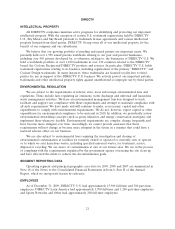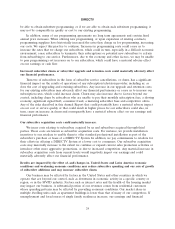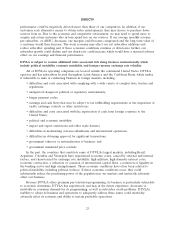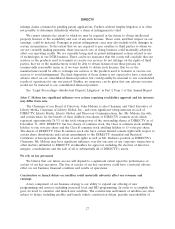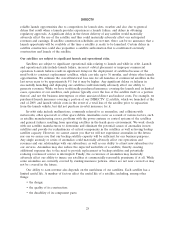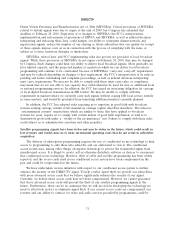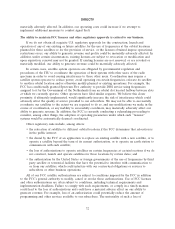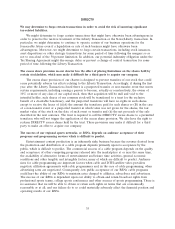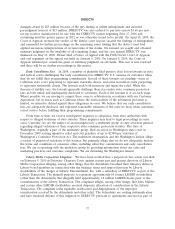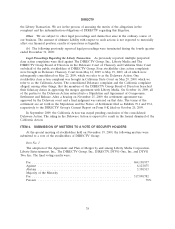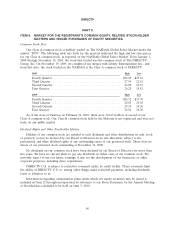DIRECTV 2009 Annual Report Download - page 43
Download and view the complete annual report
Please find page 43 of the 2009 DIRECTV annual report below. You can navigate through the pages in the report by either clicking on the pages listed below, or by using the keyword search tool below to find specific information within the annual report.DIRECTV
Home Viewer Extension and Reauthorization Act of 2004 (SHVERA). Critical provisions of SHVERA
related to distant signals were due to expire at the end of 2009, but Congress has extended that
deadline to February 28, 2010. Expiration of or changes to SHVERA, the FCC’s interpretation,
implementation and enforcement of provisions of SHVIA and SHVERA, as well as judicial decisions
interpreting and enforcing these laws, could hamper our ability to retransmit distant network and
superstation signals, reduce the number of our existing or future subscribers that can qualify for receipt
of these signals, impose costs on us in connection with the process of complying with the rules, or
subject us to fines, monetary damages or injunctions.
SHVERA, related laws, and FCC implementing rules also govern our provision of local broadcast
signals. While those provisions of SHVERA do not expire on February 28, 2010, they may be changed
by Congress. Such changes could limit our ability to deliver local broadcast signals. More generally, we
have limited capacity, and the projected number of markets in which we can deliver local broadcast
programming will continue to be constrained because of SHVERA’s ‘‘carry-one, carry-all’’ requirement
and may be reduced depending on changes to that requirement, the FCC’s interpretation of its rules in
pending and future rulemaking and complaint proceedings, as well as judicial decisions interpreting
must carry requirements. We may not be able to comply with these must carry rules, or compliance
may mean that we are not able to use capacity that could otherwise be used for new or additional local
or national programming services. In addition, the FCC has issued an increasing obligation for carriage
of local digital broadcast transmissions in HD format. We may be unable to comply with this
requirement in markets where we currently carry such signals without ceasing HD local service entirely
in some markets, and would be precluded from launching additional markets currently planned.
In addition, the FCC has adopted rules requiring us to negotiate in good faith with broadcast
stations seeking carriage outside of the mandatory carriage regime described elsewhere. The rules for
‘‘retransmission consent’’ negotiations, which are similar to those that have applied to broadcast
stations for years, require us to comply with certain indicia of good faith negotiation, as well as to
demonstrate good faith under a ‘‘totality of the circumstances’’ test. Failure to comply with these rules
could subject us to administrative sanctions and other penalties.
Satellite programming signals have been stolen and may be stolen in the future, which could result in
lost revenues and would cause us to incur incremental operating costs that do not result in subscriber
acquisition.
The delivery of subscription programming requires the use of conditional access technology to limit
access to programming to only those who subscribe and are authorized to view it. The conditional
access system uses, among other things, encryption technology to protect the transmitted signal from
unauthorized access. It is illegal to create, sell or otherwise distribute software or devices to circumvent
that conditional access technology. However, theft of cable and satellite programming has been widely
reported, and the access cards used in our conditional access system have been compromised in the
past and could be compromised in the future.
We have undertaken various initiatives with respect to our conditional access system to further
enhance the security of the DIRECTV signal. To help combat signal theft, we provide our subscribers
with more advanced access cards that we believe significantly enhance the security of our signal.
Currently, we believe these access cards have not been compromised. However, we cannot guarantee
that those advanced access cards will prevent the theft of our satellite programming signals in the
future. Furthermore, there can be no assurance that we will succeed in developing the technology we
need to effectively restrict or eliminate signal theft. If our current access cards are compromised, our
revenue and our ability to contract for video and audio services provided by programmers could be
31


